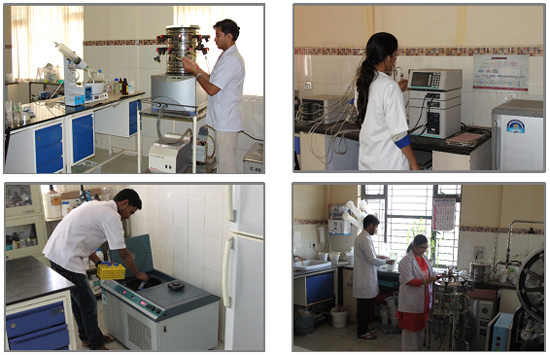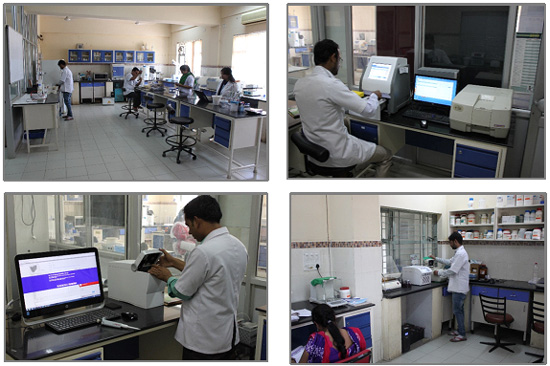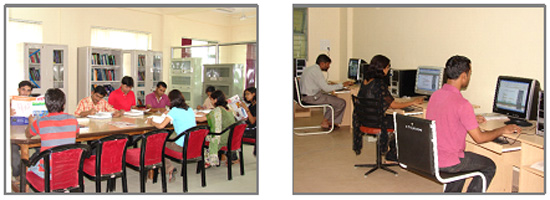The mandate of this Centre (BTC) is to provide a platform for biotechnology education,
training and research at the interface of agriculture. The programmes of the Centre
are designed to create opportunities for students to engage in multi-disciplinary
research where they learn biotechnology while integrating plant tissue culture,
genomics, genetic engineering, molecular breeding, diagnostics, bioinformatics and
use of microbes to provide solutions for enhanced agriculture production and productivity
for improving the socio- economic status of farmers, tribal and weaker sections
of society in M.P. The establishment of such an advanced and the only centre in
Madhya Pradesh for agricultural biotechnology human resource development, research
and development is of immense significance and has the following mission, mandate
and objectives.
Mission
Exploitation of modern biotechnology tools for maximizing agricultural productivity,
for improving the socio-economic status of farmers, tribal and weaker sections of
society in Madhya Pradesh.
Mandate
The mandate of this Centre (BTC) is to provide a platform for biotechnology education,
training and research at the interface of agriculture. The programmes of the Centre
are designed to create opportunities for students to engage in multi-disciplinary
research where they learn biotechnology while integrating plant tissue culture,
genomics, genetic engineering, molecular breeding, diagnostics, bioinformatics and
use of microbes to provide solutions for enhanced agriculture production and productivity
for improving the socio- economic status of farmers, tribal and weaker sections
of society in M.P.
- To generate skilled human resources in the field of biotechnology
- To conduct research in the areas of various biotechnological aspects
- Creation of public awareness regarding biotechnological innovations through extension
programmes.
Objectives
Towards fulfilling its mandate the Centre functions with the following objectives:
- Human Resource Development by various degree programmes and trainings.
- Research on plant tissue culture for multiplication of fruits, vegetables and endangered
medicinal plants through micropropagation.
- Use of molecular marker for DNA fingerprinting of agronomic crops and medicinal
plants.
- Use of molecular markers for identification qualitative and quantitative traits
associated with biotic and biotic stress.
- Development of transgenic crops for biotic and abiotic stress resistance/tolerance.
- Development of advance techniques for low-cost mass production of ethanol, enzyme,
pigments having good quality for use as food and feed.
Thrust Areas
- Development of improved varieties/hybrids with high production potential, biotic
and abiotic resistance.
- Post-harvest biotechnology including value-addition and product diversification
of important fruits and vegetables.
- Documentation of biodiversity especially endangered and threatened important species
with DNA fingerprinting / DNA barcoding.
- Routine use of molecular marker assisted selection (MAS) in plant breeding for crop
improvement.
- Developing rapid tools, bio-techniques and technologies for genetic manipulations
for introducing desirable traits for quality, biotic and abiotic stress tolerance.
- Development of efficient protocols for micropropagation of important horticultural
crops, forest trees and medicinal plants for production of quality planting materials.
- Integrated management of nutrients, diseases and pests of important biotechnological
crops to reduce input costs, environmental pollution and to avoid pesticide-residue
problems.
Research Laboratories
Leading infrastructural and technological tools, facilities and advanced laboratories
form a vital ingredient towards making cutting edge science a reality. BTC has established
necessary infrastructural facilities in its main campus at Jabalpur where it has
established major specialized facilities for tissue culture, molecular, transgenic,
fermentation and microbial biotechnology work.
Plant Tissue Culture & Transgenic Laboratory
Well Equipped Laboratory having Gene Gun, Phase Contrast, Inverted & Stereo
Microscopes with photographic Attachments, PCR machine, Shaker incubator, Low and
High Speed Refrigerated Centrifuges, Laminar Air Flow Benches (5), TC Castor Racks
(20), ELISA Reader and Washer, Cryostat, etc.

Thrust Area
- Conservation of endangered species of medicinal and aromatic plants using in vitro
techniques
- Micro-propagation of sugar cane, potato and banana
- Molecular characterization of somaclonal variants among tissue culture plants
- Development of biotic and abiotic resistant transgenic in soybean and wheat
- Development of double haploids of rice and wheat for speedy development of varieties
- Identification and isolation of genes for drought and male sterility in wheat and
rice
Salient Achievements
- Development of efficient regeneration protocol for oat (Avena sativa) and its Agrobacterium-mediated
transformation.
- Development of efficient regeneration protocol for soybean (Glycine max) and its
Agrobacterium-mediated transformation for resistance against Yellow bean mosaic
disease.
- Isolation of phy gene from soil fungi (Aspergillus spp.) and its transformation
in oat.
- Development of productive micro-propagation protocols for banana, sugarcane and
papaya.
- Initiated somatic embryogenesis in soybean and wheat for its further utilization
in genetic transformation.
- Identification of genes responsible for male sterility and fertility restoration
in wheat.
- Mass production of potato micro-tubers after disease indexing using ELISA and molecular
markers.
- Established efficient protocols for mass in vitro propagation of some important
medicinal and aromatic plants of Madhya Pradesh including low-cost protocols of
Safed musli and Sarpgandha.
Fermentation Technology
Well Equipped Laboratory having Automatic Fermenter, Laminar Flow (2), Rotary Vacuum
Evaporator, Deep Freezer, High Speed Centrifuge, Lyophilizer, Incubator shaker,
BOD Incubator, etc.

Thrust Area
- Low cost microbial pigment production technology
- Industrial enzyme production and immobilization
- Amino acid production using recombinant strains
- Single cell protein production from waste carbon sources
- Isolation and characterization of enzymes in edible and non-edible mushrooms
- phy gene cloning and expression for recombinant phytase
Salient Achievements
- Screening of Isolates for phy gene producing bacteria from soil and identified as
phy producing bacteria through 16s gene amplification and sequencing
- Molecular cloning of phy gene of Bacillus sp. has been done.
- Sixteen sequences are published in NCBI.
- The low cost material waste potatoes were used for conversion of starch present
into bio-ethanol using different species of bacteria, fungi and yeast.
- The combination of bacteria and fungi resulted into best yield of bio-ethanol under
a set of fermentation condition.
Molecular Biology
Well Equipped Laboratory having PCR machine (4), DNA Electrophoresis system (5),
Laminar Flow(1), DNA Hybridizer, Macro and Micro Shaker Bath, Deep Freezers (-20,
-40 and -87°C), Gel Documentation System, Gel Scanner, UV Spectrophotometer, Ice
Flaker, Real Time PCR, Orbital Shaker, Bioanalyzer, etc.

Thrust Areas
- Genetic diversity analysis of important crop plants
- Molecular mapping of QTL(s)/ gene(s) for biotic, abiotic stress, quality and agronomically
important characteristics.
Salient Achievements
- Molecular characterization of six important medicinal plant species (Withania somnifera,
Lapidium sativum, Chlorophytum borivilianum, Aloe barbadensis, Bacopa monnieri,
and Coleus forskohlii).
- DNA fingerprinting of minor millets (Barnyard, Foxtail, Little and Paspalum)
- DNA barcoding of medicinal plants (Mentha, Ocimum, Coleus and Cyperus)
- Molecular diversity analysis among soybean cultivars and mutants against Root rot
and Yellow Mosaic Virus Disease.
- Development of RAPD markers linked to leaf rust resistance and to screen F2 population
for leaf rust resistant/susceptible traits in wheat through bulk segregant analysis.
- The identification of molecular markers linked to drought tolerant trait in wheat.
- Identification of genetic relationship among chickpea genotype using ascochyta blight
resistance linked SSRs markers.
- Analysis of SSR markers linked to Fusarium wilt resistance loci in Desi type chickpea
genotypes.
- Molecular linkage studies for flag leaf width and leaf hair traits in rice using
recombinant inbred lines derived from cross JNPT X IR 64 using SSR markers.
- Characterization and diversity analysis of Macrophomina phaseolina isolates of soybean.
- Diversity Analysis of Fertility Restorer Genes in indica and japonica subspecies
of Rice.
- Molecular screening of disease resistance in Soybean.
- Development of Quality Protein Maize lines and hybrid.
- Morphological and Molecular characterization of water chestnut germplasm collected
from different parts of Madhya Pradesh
- Metagenomic analysis of 1-aminocyclo- propane-1- carboxyylate deaminase gene diversity
of rhizospheric and endophytic bacterial population associated with wheat.
Library of Biotechnology Centre
Library at this Centre is one of its kind, dedicated to the books on all aspects
of biotechnology including genetics, immunology, bacteriology, microbiology, virology,
proteomics, biochemistry, biocomputing and biosafety. Approximately 600 printed
reference books and 200 text books are available. Online access facilities to periodicals
inside the premises has been provided through Consortium for e-Resources in Agriculture,
ICAR (http://jgateplus.com). The Library is open to all JNKVV scientists and students
as well as to other authorized users. External personnel interested in consulting
books and journals may gain access to the Library requesting authorization during
the following working hours: Monday to Friday: 10:00 am to 5:00 pm
